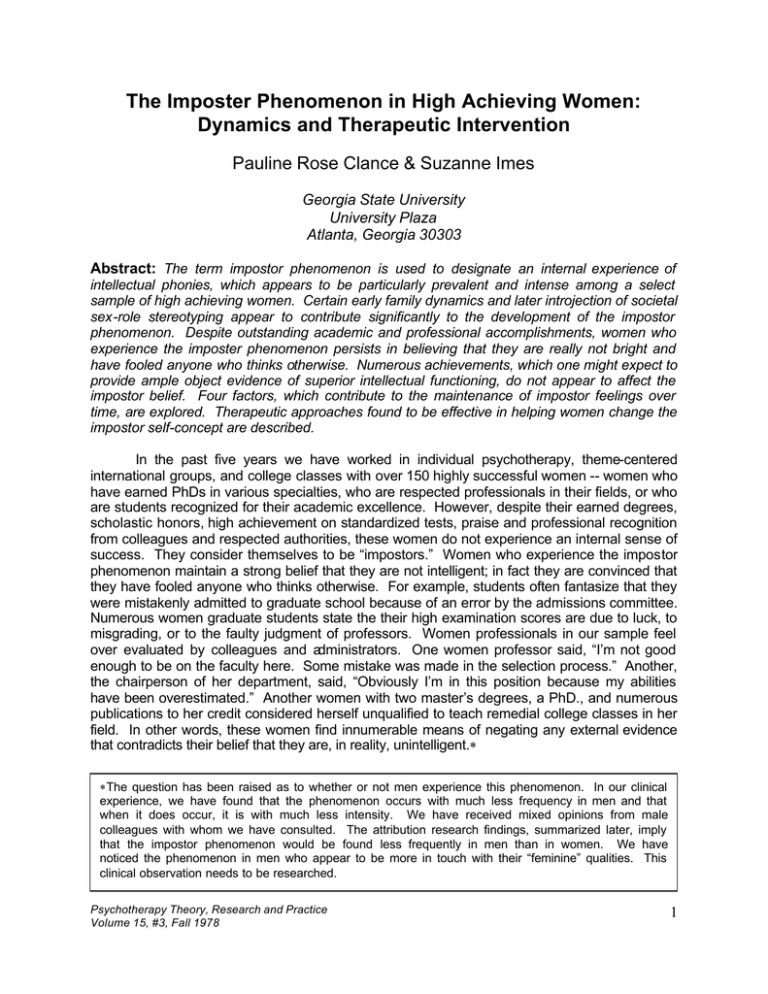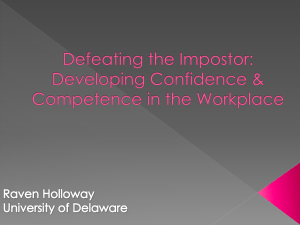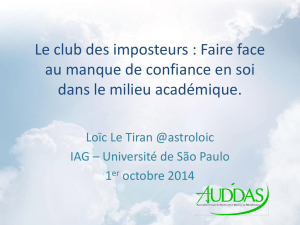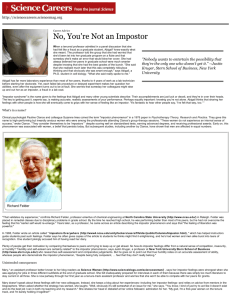The Imposter Phenomenon in High Achieving Women: Dynamics and Therapeutic Intervention
advertisement

The Imposter Phenomenon in High Achieving Women: Dynamics and Therapeutic Intervention Pauline Rose Clance & Suzanne Imes Georgia State University University Plaza Atlanta, Georgia 30303 Abstract: The term impostor phenomenon is used to designate an internal experience of intellectual phonies, which appears to be particularly prevalent and intense among a select sample of high achieving women. Certain early family dynamics and later introjection of societal sex-role stereotyping appear to contribute significantly to the development of the impostor phenomenon. Despite outstanding academic and professional accomplishments, women who experience the imposter phenomenon persists in believing that they are really not bright and have fooled anyone who thinks otherwise. Numerous achievements, which one might expect to provide ample object evidence of superior intellectual functioning, do not appear to affect the impostor belief. Four factors, which contribute to the maintenance of impostor feelings over time, are explored. Therapeutic approaches found to be effective in helping women change the impostor self-concept are described. In the past five years we have worked in individual psychotherapy, theme-centered international groups, and college classes with over 150 highly successful women -- women who have earned PhDs in various specialties, who are respected professionals in their fields, or who are students recognized for their academic excellence. However, despite their earned degrees, scholastic honors, high achievement on standardized tests, praise and professional recognition from colleagues and respected authorities, these women do not experience an internal sense of success. They consider themselves to be “impostors.” Women who experience the impostor phenomenon maintain a strong belief that they are not intelligent; in fact they are convinced that they have fooled anyone who thinks otherwise. For example, students often fantasize that they were mistakenly admitted to graduate school because of an error by the admissions committee. Numerous women graduate students state the their high examination scores are due to luck, to misgrading, or to the faulty judgment of professors. Women professionals in our sample feel over evaluated by colleagues and administrators. One women professor said, “I’m not good enough to be on the faculty here. Some mistake was made in the selection process.” Another, the chairperson of her department, said, “Obviously I’m in this position because my abilities have been overestimated.” Another women with two master’s degrees, a PhD., and numerous publications to her credit considered herself unqualified to teach remedial college classes in her field. In other words, these women find innumerable means of negating any external evidence that contradicts their belief that they are, in reality, unintelligent.∗ ∗The question has been raised as to whether or not men experience this phenomenon. In our clinical experience, we have found that the phenomenon occurs with much less frequency in men and that when it does occur, it is with much less intensity. We have received mixed opinions from male colleagues with whom we have consulted. The attribution research findings, summarized later, imply that the impostor phenomenon would be found less frequently in men than in women. We have noticed the phenomenon in men who appear to be more in touch with their “feminine” qualities. This clinical observation needs to be researched. Psychotherapy Theory, Research and Practice Volume 15, #3, Fall 1978 1 Self-declared impostors fear that eventually some significant person will discover that they are indeed intellectual impostors. One women stated, “I was convinced that I would be discovered as a phony when I took my comprehensive doctoral examination. I thought the final test had come. In one way, I was somewhat relieved at this prospect because the pretense would finally be over. I was shocked when my chairman told me that my answers were excellent and that my paper was one of the best he had seen in his entire career.” Women who exhibit the impostor phenomenon do not fall into any one diagnostic category. The clinical symptoms most frequently reported are generalized anxiety, lack of selfconfidence, depression, and frustration related to inability to meet self-imposed standards of achievement. Included in our sample have been 95 undergraduate women and 10 Ph D faculty women at a small academically acclaimed private Midwestern co-educational college; 15 undergraduates, 20 graduate students, and 10 faculty members at a large southern urban university; six medical students from northern and southern universities; and 22 professional women in such fields as law, anthropology, nursing, counseling, religious education, social work, occupational therapy, and teaching. They were primarily white middle- to upper-class women between the ages of 20 and 45. Approximately one-third were therapy clients with specific presenting problems (other than the impostor problem); the other two-thirds were in growth-oriented interaction groups or classes taught by the authors. While our focus has been on understanding the more personal, experiential effects of the impostor feelings, we find confirmation of our observations in the experimental findings of attribution theorists, who in recent years have begun to study differential attribution of success by men and women. In her review of the research on sex differences in the attribution process, Deaux (1976) points to considerable evidence that women consistently have lower expectancies than men of their ability to perform successfully on a wide variety of tasks. The findings of the research citied by Deaux are consistent with the following principals: 1) An unexpected performance outcome will be attributed to a temporary cause. 2) An expected performance outcome will be attributed to a stable cause. In line with their lower expectancies, women tend to attribute their successes to temporary causes, such as luck or effort, in contrast to men who are much more likely to attribute their successes to the internal, stable factor of ability. Conversely, women tend to explain failure with lack of ability, whereas men more often attribute failure to luck or task difficulty. Given the lower expectancies women have for their own (and other women’s) performances, they have apparently internalized into a self-stereotype the societal sex-role stereotype that they are not considered competent (see Broverman, et al., 1972; Rosenkrantz, et al., 1968). Since success for women is contraindicated by societal expectations and their own internalized self-evaluations, it is not surprising that women in our sample need to find explanation for their accomplishments other than their own intelligence -such as fooling other people. Thus, unlike men, who tend to own success as attributable to a quality inherent in themselves, women are more likely either to project the cause of success outward to an external cause (luck) or to a temporary internal quality (effort) that they do not equate with inherent ability. Deaux suggests that "If … an unexpected event is attributed to some temporary factor, then future expectancies may remain unchanged, producing a self-perpetuating cycle." She further proposes, however, that repeated success experiences over a period of time should begin to change one's expectancies. We have been amazed at the self-perpetuating nature of the impostor phenomenon -- with the pervasiveness and longevity of the impostor feelings of our high achieving women, with their continual discounting of their own abilities and persistent Psychotherapy Theory, Research and Practice Volume 15, #3, Fall 1978 2 fear of failure. We have not found repeated successes alone sufficient to break the cycle. Additional factors that appear to strengthen the maintenance of the impostor phenomenon are discussed in the following section. Origin, Dynamics and Maintenance Why do so many bright women, despite consistent and impressive evidence to the contrary, continue to see themselves as impostors who pretend to be bright but who really are not? What are the origins and dynamics of such a belief and what functions could be served by holding on to such a belief? We have observed that our "impostors" typically fall into one of two groups, with respect to early family history. In one group are women who have a sibling or close relative who have been designated as the "intelligent" member of the family. Each of the women, on the other hand, has been told directly or indirectly that she is the "sensitive" or socially adept one in the family. The implication from immediate and/or extended family members is that she can never prove that she is as bright as her siblings regardless of what she actually accomplishes intellectually. One part of her believes the family myth; another part wants to disprove it. School gives her an opportunity to try to prove it to her family and herself that she is bright. She succeeds in obtaining outstanding grades, academic honors, and acclaim from teachers. She feels good about her performance and hopes her family will acknowledge that she is more than just sensitive or charming. However, the family seems unimpressed, still attributing greater intelligence to the "bright" sibling whose academic performance is often poorer by comparison. On the one hand, the woman who feels she is an impostor continues to be driven to find ways of getting validation for her intellectual competence; on the other hand, she thinks her family may be correct, secretly doubts her intellect, and begins to wonder if she has gained her high marks through sensitivity to teachers' expectations, social skills, and feminine charms. Thus, the impostor phenomenon emerges. A different family dynamic operates for the second group of women experiencing the impostor phenomenon. The family conveys to the girl that she is superior in every way -intellect, personality, appearance, and talents. There is nothing that she cannot do if she wants to, and she can do it with ease. She is told numerous examples of how she demonstrated her precocity as an infant and toddler, such as learning to talk and read very early or reciting nursery rhymes. In the family members' eyes she is perfect. The child, however, begins to have experiences in which she cannot do any and everything she wants to. She does have difficulty in achieving certain things. Yet she feels obligated to fulfill expectations of her family, even though she knows she cannot keep up the act forever. Because she is so indiscriminately praised for everything, she begins to distrust her parents' perceptions of her. Moreover, she begins to doubt herself. When she goes to school her doubts about her abilities are intensified. Although she does outstanding work, she does have to study to do well. Having internalized her parents' definition of brightness as "perfection with ease," and realizing that she cannot live up to this standard; she jumps to the conclusion that she must be dumb. She is not a genius; therefore, she must be an intellectual impostor. Psychotherapy Theory, Research and Practice Volume 15, #3, Fall 1978 3 One of our clients who had trouble with spelling remembers that she pretended to be "sick" for three consecutive Fridays when spelling bees were held. She could not bear the thought of her parents finding out she could not win the spelling contest. Another client recalled that when she was studying she would pretend to be playing with her art material whenever her mother walked in the room. Her mother had made it very clear to her that smart people do not have to study. By using such cover-up strategies our clients believe they have managed to fool their parents, but internally they are painfully convinced they are phonies. As we have indicated, our observations have led us to believe that the impostor phenomenon begins to develop originally in both groups of girls in relation to the family. It has been suggested to us that the real root of the problem lies in social expectations mentioned earlier. This is a chicken or egg problem that definitely needs to be researched. However, our current hypothesis is that the high achieving women in our sample escaped, at least to some degree, the societal sex-role stereotyping in the preschool years that can be transmitted through the parents. Even the women in our sample who were not considered the brighter child were expected by their parents to do well in school. The fact that these women continued to succeed in spite of antithetical societal expectations implies strong early instilment of achievement motivation. We do believe that the societal stereotype of women being less able intellectually than men begins to exacerbate and confirm at an early age the self-doubts that have already begun to develop in the context of the family dynamics. One study (Nicholls, 1975) indicates that differential attribution of success and failure by girls and boys is already operative by the age of ten. The girls in the "sensitive" group appear to develop their original self-doubts about their intellect from the differential between their perception that they are not considered bright and their actual high achievements. The girls in the "bright " group first develop self-doubts from the small differential between what they are expected to achieve and what they can achieve. Feelings of phoniness for both groups are further affirmed by the differential between high achievement and low societal expectations. The women's own self-image of being a phony is consonant with the societal view that women are not defined as being competent. If a woman does well, it cannot be because of her ability but must be because of some fluke. If she were to acknowledge her intelligence, she would have to go against the views perpetuated by a whole society - an ominous venture indeed! And yet the women we have encountered, by their very perseverance in continuing to succeed against tremendous odds, appear to want also to prove themselves and society wrong. At the same time there are intense and deep-seated beliefs in the impostor position, there are also strong (though frequently unsuccessful) attempts to overcome it. Why is the impostor phenomenon so difficult to overcome? We have observed at least four different types of behaviors, which tend to maintain the impostor phenomenon once the posture of being an intellectual phony has been assumed. A woman may participate in one or more of these behaviors, but seldom all of them. The first type of behavior involves diligence and hard work. The fear that "my stupidity will be discovered" is constantly present; consequently the woman studies or works very hard to prevent the discovery. Hard work and study pay off in excellent performance and approval from authorities. The cycle, worry about intelligence -- hard work and cover-up strategies -- good grades or performance -- approval and temporary good feelings, is reinforcing. The woman feels elated temporarily and such feelings of success make the cycle very hard to give up. She develops an unstated but vaguely aware belief that if she were to think she could succeed she would actually fail. Her belief takes on the quality of a magical ritual, which will guarantee at least an overt success. However, the success is an empty one, and the good feelings are short lived because the underlying sense of phoniness remains untouched. Psychotherapy Theory, Research and Practice Volume 15, #3, Fall 1978 4 A second mode of behavior centers on a sense of phoniness, which is based in part in reality. Many of our clients engage in intellectual inauthenticity in one way or another. They have chosen at times not to reveal their real ideas or opinions. Instead they have accurately "psyched out" their professors, supervisors, and colleagues and given them what they most wanted to hear. They have participated in "intellectual flattery." For example, a student might note a professor's biases and be sure to cite numerous studies, which would support those biases on an exam question or in a paper, even though she might personally hold different views. In writing a grant proposal for an educational program one client included her supervisor's ideas and downplayed her own. A subtler example is the woman who remains silent in the face of an opposing viewpoint. Consequently she is left with the impression, "If I had revealed what I really think and believe, I might not have done well. I might have been considered unintelligent." This type of avoidance prevents our clients from discovering whether or not authentic views would have been evaluated as sensible, and it thus contributes to the maintenance of the impostor phenomenon. Another kind of behavior has to do with using charm and perceptiveness to win the approval of superiors. For a woman who uses charm in this way, the aim is to be liked as well as to be recognized as intellectually special. Typically, she believes, "I am stupid," but at anther level she believes she is brilliant, creative, and special if only the right person would discover her genius and thereby help her believe in her intellect. She first finds a candidate she respects and then proceeds to impress that person. She studies the person carefully and perceives very accurately what that person will be responsive to. She uses her friendliness, charm, looks, humor, sexuality, and perceptiveness to win the person over. For example, if the potential mentor grows mushrooms, the woman will make it her business to be able to converse enthusiastically and knowledgably about mushroom growing. If the candidate is in a difficult situation, the woman listens with understanding and concern. She may volunteer to assist a professor with his/her pet research project. She may even become sexually involved with her mentor. This process of seeking (and usually gaining) approval from an admired authority figure is unsuccessful in changing the impostor system for two reasons. First, even when the mentor does acclaim her as intellectually superior, creative, and special, she does not believe him/her because she believes the mentor has based his/her opinion primarily on her other attributes. The current candidate is discounted as unable to judge her accurately. She begins a search for another mentor and will repeat the same self-defeating process. Second, the woman continues to believe that if she were really bright she would not need outside approval. She should have internally-based confidence in her own ability. Thus, efforts to gain approval give proof that she is intellectually phony. After all, people who are geniuses or innovators in their fields manage to be productive and creative despite lack of support from others; they certainly would not resort to adaptive or placating behaviors to gain validation. To engage in such phoniness is to lack integrity in the eyes of our clients. The phenomenon may be further maintained in response to the negative consequences that are likely to befall the woman in our society who displays confidence in her ability. Margaret Mead (1949) has noted that the successful or independent woman "is viewed as a hostile and destructive force within society." According to Mead, a woman's femininity is called into question by her success. Martina Horner's (1972) studies support Mead's observation that for a woman to succeed in our culture is indeed a fearsome venture. Horner indicates that many women have motive to avoid success out of a fear that they will be rejected or considered less feminine if they do succeed. Maccoby (1963) has asserted that "the girl who maintains qualities of independence and active striving (achievement-orientation) necessary for intellectual mastery defies the convention of sex-appropriate behavior and must pay a price, a price in anxiety." To maintain a sense of herself as being an intellectual phony may allow a high Psychotherapy Theory, Research and Practice Volume 15, #3, Fall 1978 5 achieving woman to live out her achievement orientation to a large degree and at the same time allay some of her fears about the negative consequences of being a successful woman in our society. As long as she maintains the notion that she is not bright, she imagines that she can avoid societal rejection. Therapy Evidence of the impostor phenomenon has typically emerged after an individual has been in a group or individual psychotherapy for several sessions. It is rarely stated as the presenting problem since it is a well-guarded secret, which is not shared immediately. The "imposter" is so convinced her belief is correct that nothing could be done to change it anyway. She also believes that if she revealed her assumed unique feelings of phoniness she would meet with criticism or at least very little understanding on the part of others. It is generally her anxiety about achieving a particular goal, which leads her to disclosed feelings of intellectual phoniness. A multi-modal therapy in which several therapeutic approaches are used concurrently seems most effective in altering the impostor belief in a client. A group therapy setting or an inter-actional group in which there are some other high achieving women experiencing the impostor phenomenon is highly recommended. If one woman is willing to share her secret, others are able to share theirs. They are not astonished and relieved to find they are not alone. A group setting is also valuable because one woman can see the dynamics in another woman and recognize the lack of reality involved. Mary cannot believe that Jane thinks she is stupid. After all, Jane has a PhD from an outstanding university, is a respected professor, and is obviously bright. In a group setting, the ways in which an individual negates positive feedback and maintains her belief system emerge in clear relief and can be brought to the attention of the client. The client needs to become aware of the superstitious, magical aspects of her impostor belief and must consciously experiment with changing her ritualistic behaviors. For example, she is encouraged to study for an exam with the expectation, "I will do well on this exam" rather than, "I may fail." When she is able to succeed without the self-doubting beforehand, she has made a major breakthrough in undoing her ritual of predicting failure. Weekly homework assignments to practice new ideas about the self as well as to decrease compulsive work habits (which perpetuate "effort" attributions) can also be very useful. However, we have found that such assignments must be suggested in small, incremental steps. Since the old phoniness feelings and hard-work habits are so powerfully associated with at least overt success, trying to give them up too quickly, before other attitudes and habits have been experienced as personally more satisfying, can result in acute anxiety and/or reversion to the relative security of old ways. One effective Gestalt experiment is to have the client recall all the people she thinks she has fooled, to tell them in fantasy how she conned or tricked them, and to have her imagine out loud how each person would respond to her. "I did not give you an award in English because you charmed me. I did like you as a person but I honored you for your outstanding work," or "I'm angry that you think I'm so stupid that I can't judge competence when I see it," or "I don't like your negating me and my opinions." A helpful homework assignment is to have the client keep a record of positive feedback she receives about her competence and how she keeps herself from accepting this feedback. After she becomes aware of how she denies compliments, she is instructed to experiment with Psychotherapy Theory, Research and Practice Volume 15, #3, Fall 1978 6 doing the opposite -- to listen, to take in the positive response, and to get as much nourishment as possible out of it. Another producuive Gestalt technique is to have the client role-play the opposite of "I'm not bright," i.e., to have her act out being bright, feeling it and expressing it in the presence of the group or therapist. Reactions to this role play are varied. Frequently a woman gets in touch with and is able to reveal a heretofore hidden fantasy that she is special and outstanding -- a facet of the self-image that lurks beneath the overriding feeling of self-doubt. She can then work through the fears and guilt that accompany the fantasy of specialness and can move toward a realistic and self-affirming view of her own abilities, neither overestimating nor underestimating them. This role play helps some women confront their fears of success. This usually happens when a client is particularly resistive to the exercise, having difficulty acting out such an "arrogant" position. Through confronting her resistances to the exercise, the client confronts her catastrophic fantasies about the consequences of being successful. She may discover she is frightened that others would consider her exhibitionistic, snobbish, or unfeminine. Such fears are often accompanied by memories of concrete experiences, such as being kidded by other children when teachers singled her out for outstanding work or being shunned by boys who felt intellectually inferior. In taking the stance of being bright and capable, many women experience a rewarding sense of their personal power. If, as is often the case, they receive applause from other group members for such self-affirmation, their fears about acknowledging their brightness begin to subside. For a woman who has used charm and/or intellectual flattery to gain approval from authority figures, much time is spent on increasing awareness of those times when she is being phony -- when she does or says something she does not want to in the hope of gaining approval. She is encouraged to risk "being herself" and seeing what happens. Usually the catastrophic expectations do not occur. Also, by eliminating approval-getting behaviors, the woman can begin to accept compliments from others regarding her intelligence as being "real" and can internalize the external reinforcement she does receive. In the course of therapy, these clients are also encouraged to seek out people who will support them in their struggle to be authentic and not to depend on those who would be threatened by their abilities and achievements. As a result of a combination of such therapeutic interventions in conjunction with a commitment to change, a high achieving woman who has previously considered herself an impostor begins to allow herself to state and feel, "I am intelligent. I have learned and achieved a tremendous amount. It is all right for me to believe in my own intellectual abilities and strengths." She begins to be free of the burden of believing she is a phony and can more fully participate in the joys, zest, and power of her accomplishments. References Broverman, I.K.; Vogel, S.R.; Broverman, D.M.; Clarkson, F.E. & Rosenkrantz, P.S. Sex role stereotypes: A current appraisal. Journal of Social Issues. 1972. 28, 59-78. Deaux, D. Sex and the attribution process. In J.H. Harvey, W.J. Ickes & R.F. Kidd (Eds.). New directions in attribution research. Vol. 1. New York: Halsted Press Division, Wiley. 1976. pp. 335-352. Horner, M.S. Toward an understanding of achievement -- related conflicts in women. Journal of Social Issues. 1972. 28, 157-175. Maccoby, E.E. Woman's intellect. In S. M. Farber and R. H. L. Wilson (Eds.). The Potential of Woman. New York: McGraw-Hill. 1963. 24-39. Psychotherapy Theory, Research and Practice Volume 15, #3, Fall 1978 7 Mead, M. Male and Female. New York: Morrow, 1949. Also, New York: Dell, (Laurel Ed.), 1958. Nicholls, J.G. Casual attributions and other achievement-related cognitions: Effects of task outcome, attainment value and sex. Journal of Personality and Social Psychology. 1975. 31, 379-389. Rosenkrantz, P.S.; Vogel, S.R.; Bee, H.; Broverman, I.K. & Broverman, D.M. Sex-role stereotypes and self-concepts in college students. Journal of Consulting and Clinical Psychology. 1968. 32, 287-195. Psychotherapy Theory, Research and Practice Volume 15, #3, Fall 1978 8






